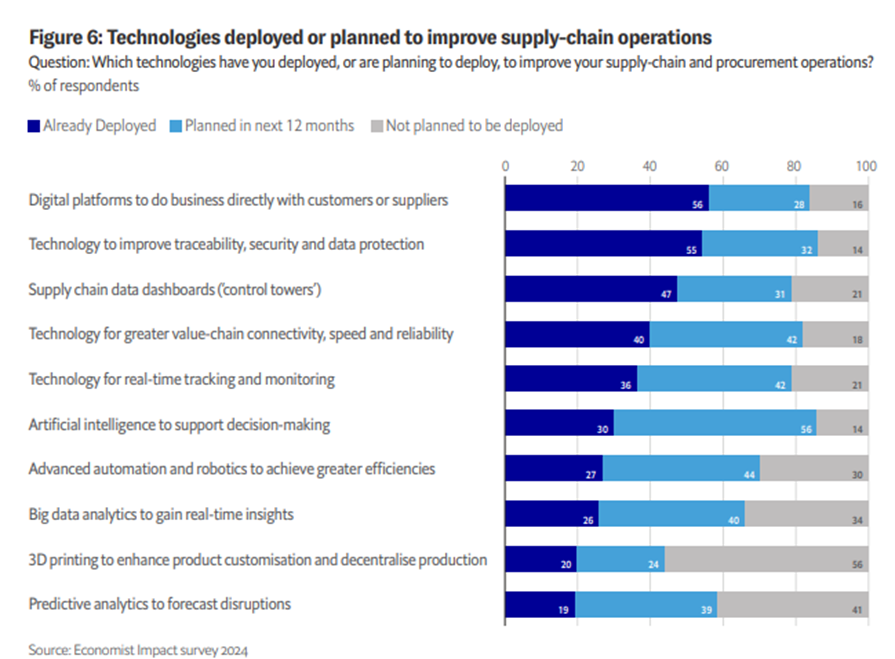
57% Companies Looking at AI to Support Supply Chain Decisions: Economist Impact Survey 2024
- 40% plan to invest in big data analytics to gain real-time insights into their operations.
- 42% keen to invest in technology for real-time tracking and monitoring within supply chains.
- Report based on survey of executives in the U.S. and Europe familiar with supply chain operations in their organizations.
August 02, 2024 | Supply Chain Strategy
Organizations are moving toward widespread adoption of AI and data analytics in their supply chain, according to latest Economist Impact report on next-gen supply chains.
The survey-based report, sponsored by GEP, provides insights into the strategic plans of procurement and supply chain executives to leverage technology for operational improvement.
The survey was conducted between January and March of 2024 of 400 executives in the U.S. and Europe who were familiar with their company’s procurement and supply chain operations.
The AI & Automation Investment Wave
The survey's findings reveal an eye-opening statistic: 57% of businesses are looking to invest in AI specifically to refine their supply chain and procurement operations over the next twelve months. Additionally, 44% are planning to deploy advanced automation technologies.
These figures indicate a growing trend in corporate strategy towards the digital transformation of core operations. This widespread adoption of technology is driven by the overarching belief among business leaders that AI and automation are essential tools for achieving significant cost reductions and boosting operational agility.

Decision-Making and Real-Time Insights Enhanced by AI
The survey highlights that 56% of respondents are keen on deploying AI in their decision-making processes. AI excels in crunching extensive data sets rapidly and with high accuracy, enabling executives to make informed, strategic decisions on the fly. This capability transforms traditional decision-making, allowing businesses to respond to market changes with a level of precision and foresight previously unattainable.
In tandem, big data analytics is becoming indispensable in overhauling supply chain operations, with 40.5% of companies gearing up to invest in this technology.
The aim is to harness real-time data for immediate insights that propel smarter, faster business decisions.
In an unpredictable market environment, the ability to swiftly process and interpret vast amounts of operational data is critical. Real-time analytics enable a proactive approach, empowering companies to navigate potential challenges and seize emerging opportunities effectively.
A real-world example of these technologies at work can be seen in major logistics companies that implement AI and big data analytics to optimize their delivery routes and inventory management. By analyzing real-time traffic data and weather conditions, the companies could make quick adjustments to delivery schedules, reducing delays and improving customer satisfaction.
This shows how AI and big data analytics are vital tools for modern businesses to maintain a competitive edge.
Improved Tracking and Monitoring with Real-Time Technology
The survey also highlights a growing commitment to enhancing tracking and monitoring within supply chains, with 42% of businesses planning such investments.
The integration of real-time tracking technologies is critical for achieving greater transparency across the supply chain, from procurement to delivery. These technologies enable companies to monitor goods and materials with unprecedented accuracy, providing a continuous flow of data that aids in optimizing inventory levels and improving overall supply chain efficiency.
Enhancing connectivity within the value chain is another significant area of investment, attracting 42.5% of businesses according to the survey.
In the interconnected world of global commerce, the ability to maintain robust, reliable, and speedy connections across the value chain is indispensable. Investing in connectivity technologies not only improves the coordination between different segments of the supply chain but also enhances the resilience of operations against disruptions, thereby supporting sustained business growth.
The Economist Impact survey 2024 underlines a critical and strategic pivot in the global business landscape, with supply chain and procurement executives increasingly turning to AI and data analytics as fundamental elements of their operational strategy. This shift is indicative of a broader recognition of the transformative potential of these technologies, which promise improvements and a redefinition of industry standards.
Download the full report Next-gen supply chains: The transformative role of supply-chain leaders in today’s business.



